What Should I Wear?



Formal wear that covers the legs is appropriate. However, we encourage adult guests to wear Indian clothing if possible.
Dos
-
Go as big as you want! Don’t worry about “upstaging the bride” – such is not a concern in Indian culture.
-
Colorful and ornate attire is encouraged
-
Show part of your stomach if you are comfortable. All women, even the elders, do so at formal events in India.
-
Order “ready wear”, “stitched”, or “pre-draped” options
Don'ts
-
Don’t wear all-over white since this color is associated with mourning.
-
Don't worry about wearing the same color as the bride – this happens all the time in Indian weddings
-
Don’t expose your legs
-
Don’t order “semi-stitched” or “unstitched” as this option requires a tailor

What do women wear?
Saree

A saree is the most traditional Indian garment consisting of one long, unstitched piece of fabric, typically 5 to 9 yards, draped elegantly around the body. Sarees are beautiful, but ensure you purchase "pre-draped" and "Stitched" Sarees to make it easier for you to wear. Charul, the mother of the Groom, would be happy to help you wear your Saree.
shop
Select "stitched" and "pre-draped"
Select "stitched" and "pre-draped"
Luxe
Select "stitched" and "pre-draped"
Lehenga

A lehenga is a traditional Indian outfit featuring a long, flared skirt paired with a fitted blouse (choli) and a dupatta (scarf). Known for its rich embroidery and vibrant colors, it is often worn for festive occasions, weddings, and celebrations. Lehengas are easier to wear than Sarees since the skirt and blouse is worn as you would expect.
shop
Utsav (under $80)
Select "Ready to Wear"
Luxe
Salwar Kameez

A salwar is a traditional Indian garment comprising loose-fitting trousers that taper at the ankles, typically paired with a kameez (long tunic) and often accompanied by a dupatta (scarf). Comfortable and versatile, it features various styles and fabrics, making it suitable for both casual and formal occasions. This option is excellent for ladies looking to cover their stomach.
shop
Luxe

Indo-Western
Indo-Western style blends traditional Indian clothing elements with contemporary Western fashion, creating a fusion of elegance and modernity. This style often features Indian fabrics, embroidery, or silhouettes paired with Western cuts, such as saree gowns, dhoti pants with crop tops, or kurtas styled. There are also many Indo-western looks which cover the stomach.
shop
Luxe
What do men wear?

Sherwani

A sherwani is a long, fitted coat-like garment traditionally worn by men in South Asia, typically made of rich fabrics like silk or brocade. It features intricate embroidery or embellishments and is often paired with churidars (trousers), making it a popular choice for formal occasions and weddings.
shop
Link does not work in Chrome
Luxe
Kurti Set

A kurta set consists of a long, loose-fitting tunic-style top called a kurta, paired with bottoms such as pajama-style trousers, churidars, or salwars. Made from lightweight fabrics like cotton or silk, it is a versatile outfit suitable for casual, festive, or formal occasions in South Asia.
shop
Luxe
Jodhpuri Set

A Jodhpuri set, also known as a Bandhgala, is a formal Indian outfit that includes a tailored, high-collared jacket paired with matching trousers. Often made from luxurious fabrics and adorned with subtle embroidery or embellishments, it exudes sophistication and is commonly worn at weddings or other grand occasions.
shop
Luxe

Indo-Western
Indo-western style for men blends traditional Indian elements with contemporary Western fashion, creating a fusion of elegance and modernity. It typically features outfits like asymmetrical kurtas, dhoti-style pants, or Nehru jackets paired with Western trousers, often enhanced with bold cuts, embellishments, or unique draping styles.
shop
Luxe

What about accessories?
Whether you want to supplement your look or add a bit of Indian flare to your western outfit, accessories are always the right choice!
Jhumkas

Jhumkas are a traditional style of earrings originating in the Indian subcontinent, characterized by their bell-shaped design. The word "jhumka" is derived from the Hindi word "jhumki," meaning a hanging ornament. These earrings are a timeless accessory in South Asian culture, often associated with elegance and femininity.
shop
Link does not work in Chrome
Maang Tikka

A maang tikka is a traditional Indian hair accessory worn on the forehead, consisting of a chain with a decorative pendant that rests on the hairline, secured at the parting (maang). It is often adorned with intricate designs, gemstones, or pearls, and symbolizes cultural elegance, especially in bridal and festive attire. If you choose to wear one, you'll also need bobby pins and lash glue to secure it.
shop
Jewerly Sets

A festive Indian jewelry set for women typically includes a necklace (often a choker or long chain), matching earrings (such as jhumkas), bangles or bracelets, a maang tikka for the forehead, and sometimes an ornate ring or a nose ring (nath). These sets are often embellished with gold, gemstones, pearls, or intricate enamel work, reflecting opulence and cultural artistry.
shop
Link does not work in Chrome
Link does not work in Chrome
Still stuck?
Don't worry! Send a message to Lara (201-316-4585) and she will find options for you. If you are not in a position to purchase clothing, she can connect you with a family friend that can lend their clothing for this occasion.






